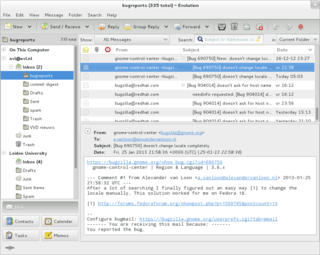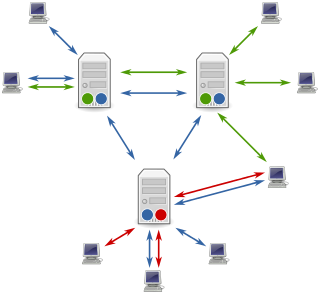Related Research Articles

Electronic mail is a method of exchanging messages ("mail") between people using electronic devices. Email was thus conceived as the electronic (digital) version of, or counterpart to, mail, at a time when "mail" meant only physical mail. Email later became a ubiquitous communication medium, to the point that in current use, an email address is often treated as a basic and necessary part of many processes in business, commerce, government, education, entertainment, and other spheres of daily life in most countries. Email is the medium, and each message sent therewith is called an email.

Spamming is the use of messaging systems to send multiple unsolicited messages (spam) to large numbers of recipients for the purpose of commercial advertising, for the purpose of non-commercial proselytizing, for any prohibited purpose, or simply repeatedly sending the same message to the same user. While the most widely recognized form of spam is email spam, the term is applied to similar abuses in other media: instant messaging spam, Usenet newsgroup spam, Web search engine spam, spam in blogs, wiki spam, online classified ads spam, mobile phone messaging spam, Internet forum spam, junk fax transmissions, social spam, spam mobile apps, television advertising and file sharing spam. It is named after Spam, a luncheon meat, by way of a Monty Python sketch about a restaurant that has Spam in almost every dish in which Vikings annoyingly sing "Spam" repeatedly.
news.admin.net-abuse.email is a Usenet newsgroup devoted to discussion of the abuse of email systems, specifically through spam and similar attacks. According to a timeline compiled by Keith Lynch, news.admin.net-abuse.email was the first widely available electronic forum for discussing spam.
The Spam Prevention Early Warning System (SPEWS) was an anonymous service which maintained a list of IP address ranges belonging to Internet service providers (ISPs) which host spammers and show little action to prevent their abuse of other networks' resources. It could be used by Internet sites as an additional source of information about the senders of unsolicited bulk email, better known as spam.

Laurence A. Canter and Martha S. Siegel were partners in a husband-and-wife firm of lawyers who posted the first massive commercial Usenet spam on April 12, 1994. This event came shortly after the National Science Foundation lifted its unofficial ban on commercial speech on the Internet, and it marks the end of the Net's early period in some views, when the original netiquette could still be enforced.

UUNET, founded in 1987, was one of the largest Internet service providers and one of the early Tier 1 networks. It was based in Northern Virginia and was one of the first commercial Internet service providers. Today, UUNET is an internal brand of Verizon Business.

Mobile phone spam is a form of spam, directed at the text messaging or other communications services of mobile phones or smartphones. As the popularity of mobile phones surged in the early 2000s, frequent users of text messaging began to see an increase in the number of unsolicited commercial advertisements being sent to their telephones through text messaging. This can be particularly annoying for the recipient because, unlike in email, some recipients may be charged a fee for every message received, including spam. Mobile phone spam is generally less pervasive than email spam, where in 2010 around 90% of email is spam. The amount of mobile spam varies widely from region to region. In North America, mobile spam steadily increased after 2008 and accounted for half of all mobile phone traffic by 2019. In parts of Asia up to 30% of messages were spam in 2012.
Stephen John "Steve" Linford is a British entrepreneur and anti-spam campaigner best known for founding The Spamhaus Project.

Email spam, also referred to as junk email, spam mail, or simply spam, is unsolicited messages sent in bulk by email (spamming).
Email marketing is the act of sending a commercial message, typically to a group of people, using email. In its broadest sense, every email sent to a potential or current customer could be considered email marketing. It involves using email to send advertisements, request business, or solicit sales or donations. Email marketing strategies commonly seek to achieve one or more of three primary objectives, to build loyalty, trust, or brand awareness. The term usually refers to sending email messages with the purpose of enhancing a merchant's relationship with current or previous customers, encouraging customer loyalty and repeat business, acquiring new customers or convincing current customers to purchase something immediately, and sharing third-party ads.

The Spamhaus Project is an international organisation based in the Principality of Andorra, founded in 1998 by Steve Linford to track email spammers and spam-related activity. The name spamhaus, a pseudo-German expression, was coined by Linford to refer to an internet service provider, or other firm, which spams or knowingly provides service to spammers.
Email filtering is the processing of email to organize it according to specified criteria. The term can apply to the intervention of human intelligence, but most often refers to the automatic processing of messages at an SMTP server, possibly applying anti-spam techniques. Filtering can be applied to incoming emails as well as to outgoing ones.

Bulletproof hosting (BPH) is technical infrastructure service provided by an Internet hosting service that is resilient to complaints of illicit activities, which serves criminal actors as a basic building block for streamlining various cyberattacks. BPH providers allow online gambling, illegal pornography, botnet command and control servers, spam, copyrighted materials, hate speech and misinformation, despite takedown court orders and law enforcement subpoenas, allowing such material in their acceptable use policies.
Robert Alan Soloway is the founder of the so-called "Strategic Partnership Against Microsoft Illegal Spam," or SPAMIS, but is said to be one of the Internet's biggest spammers through his company, Newport Internet Marketing (NIM). He was arrested on May 30, 2007, after a grand jury indicted him on charges of identity theft, money laundering, and mail, wire, and e-mail fraud. He was nicknamed the "Spam King" by prosecutors.

Savvis is a subsidiary company of Lumen Technologies that sells managed hosting and colocation services headquartered in Town and Country, Missouri. The company owns more than 50 data centers spread across North America, Europe, and Asia and provides information technology consulting. Savvis has approximately 2,500 unique business and government customers.

Chunghwa Telecom Company, Ltd. is the largest telecommunications company in Taiwan and the incumbent local exchange carrier of PSTN, Mobile, and broadband services in the country.

Usenet is a worldwide distributed discussion system available on computers. It was developed from the general-purpose Unix-to-Unix Copy (UUCP) dial-up network architecture. Tom Truscott and Jim Ellis conceived the idea in 1979, and it was established in 1980. Users read and post messages to one or more topic categories, known as newsgroups. Usenet resembles a bulletin board system (BBS) in many respects and is the precursor to the Internet forums that have become widely used. Discussions are threaded, as with web forums and BBSs, though posts are stored on the server sequentially.

CompuServe Inc. v. Cyber Promotions, Inc. was a ruling by the United States District Court for the Southern District of Ohio in 1997 that set an early precedent for granting online service providers the right to prevent commercial enterprises from sending unsolicited email advertising - also known as spam - to its subscribers. It was one of the first cases to apply United States tort law to restrict spamming on computer networks. The court held that Cyber Promotions' intentional use of CompuServe's proprietary servers to send unsolicited email was an actionable trespass to chattels and granted a preliminary injunction preventing the spammer from sending unsolicited advertisements to any email address maintained by CompuServe.

Melaleuca, Inc. v. Hansen was a United States District Court for the District of Idaho case which clarified the meaning of "internet access provider" and "direct adverse" effect as used in the Controlling the Assault of Non-Solicited Pornography and Marketing Act of 2003, or CAN-SPAM Act of 2003, 15 U.S.C. ch. 103

Gordon v. Virtumundo, Inc., 575 F.3d 1040, is a 2009 court opinion in which the United States Court of Appeals for the Ninth Circuit addressed the standing requirements necessary for private plaintiffs to bring suit under the Controlling the Assault of Non-Solicited Pornography and Marketing Act of 2003, or CAN-SPAM Act of 2003, 15 U.S.C. ch. 103, as well as the scope of the CAN-SPAM Act's federal preemption. Prior to this case, the CAN-SPAM Act's standing requirements had not been addressed at the Court of Appeals level, and only the Fourth Circuit had addressed the CAN-SPAM Act's preemptive scope.
References
- ↑ "Pink Contract Definition". The Jargon File, version 4.4.7.
- ↑ "Pink Contract". SpamCop. Archived from the original on 2008-05-10.